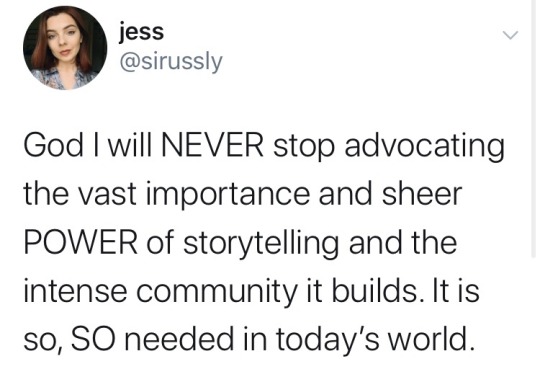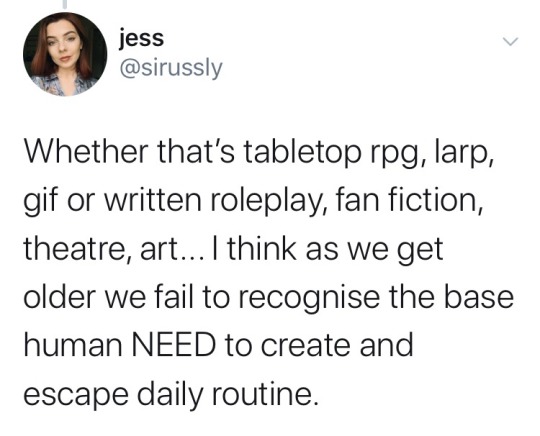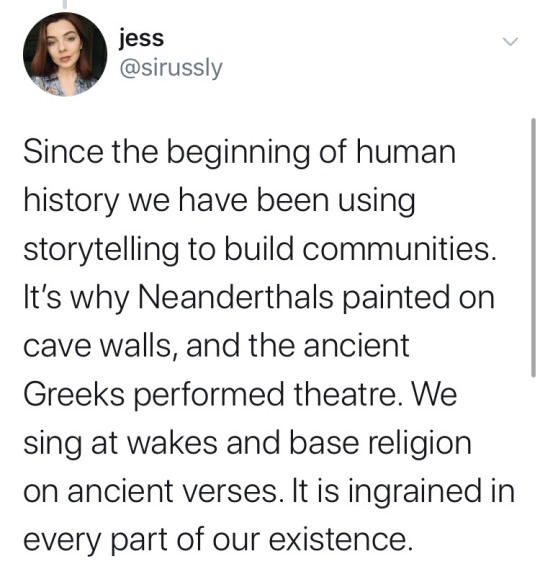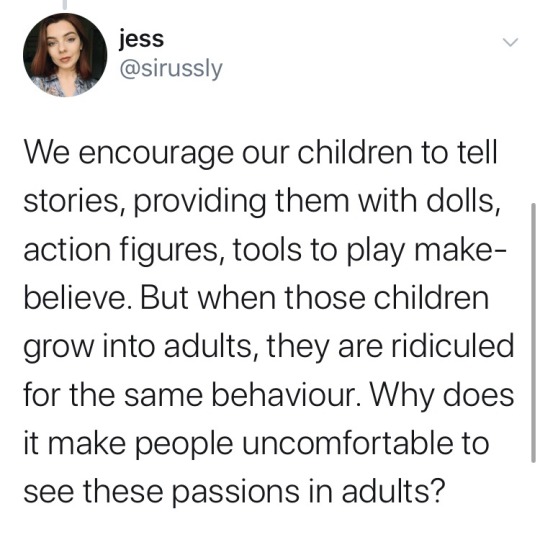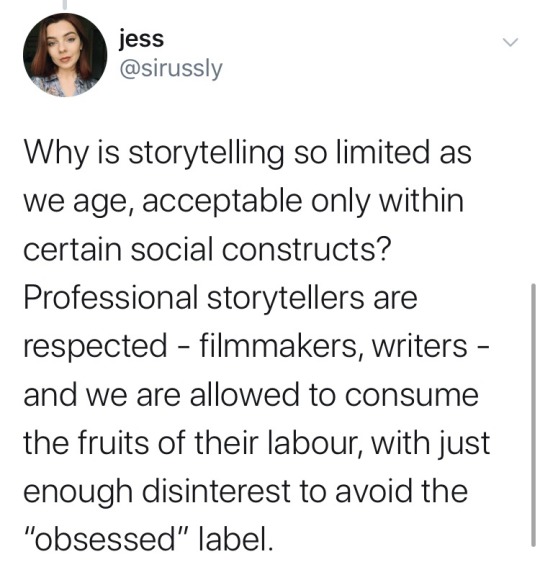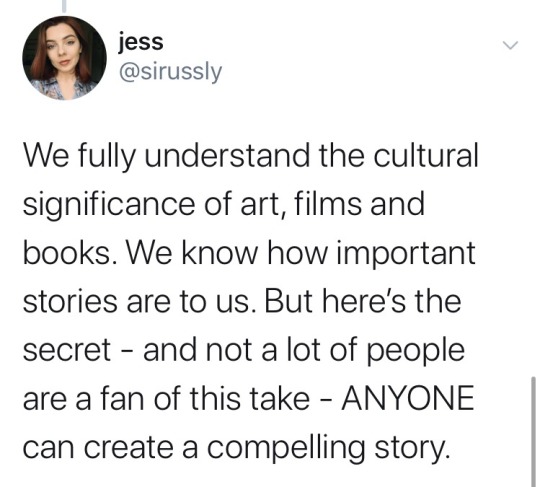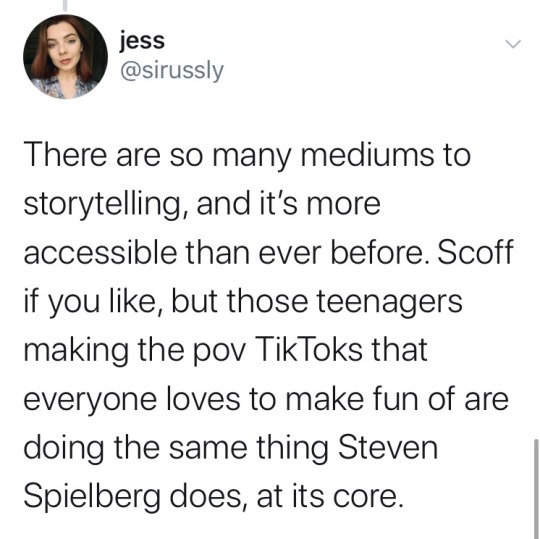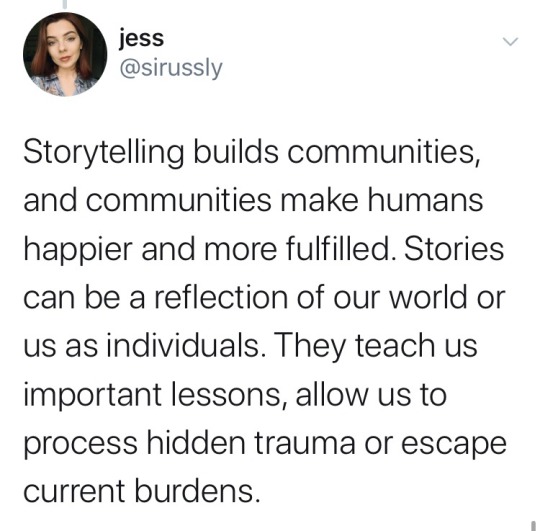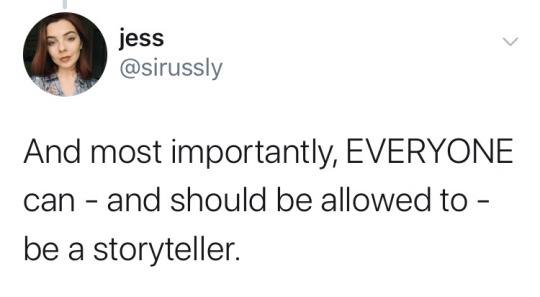A place for me to showcase my intriguing creative endeavours in writing and story telling. There’ll probably be some other anecdotes and shenanigans along the way.
Don't wanna be here? Send us removal request.
Text
A thread of writing tips
A year ago or so I asked you guys to send in your best writing tips. I've compiled a list of some of the responses below. Oh, let's just ignore that it's been a whole year.
1. Take writing advice with a grain of salt. Every writer’s brain is different. Every person’s life is different. Every creative style is different. What works for some people won’t work for another. On top of that, some advice is just plain not helpful in the first place. So try to limit how much writing advice you take in because it can leave you spinning like a top until you can’t tell which way is up. Read more, write more and you’ll figure out what works for you eventually. [from @the-writers-bookshelf]
2. If you ever get stuck, vent about it to a friend or a notes document until a way forward presents itself. [from @scarlet-curls]
3. Be gentle with yourself. If you push yourself too hard too fast, you’re going to burn out, and then you either won’t be able to write anything, or you’re not going to particularly enjoy it, because you’re trying squeeze the last drops of water from a dry sponge. If you are burnt out, give yourself time to fill back up. Absorb other people’s work as a reader, as a viewer, as a general consumer. Let it give you inspiration and enthusiasm about your work again, and then when you feel ready, go back to writing. A metaphor I liked is that creating is breathing out, and enjoying other’s mediums is breathing in. As you breathe in more, you’re probably going to get the desire to create, but if you only exhale, you might metaphorically pass out. [from @writing-with-olive]
4. Arrive late, leave early. That advice has really helped me cut the excess out of scenes, and find what's essential / what's really adding to the story. It also keeps you hanging on, feeling excited to write the next scene because you're not divulging too much. You're jumping in and out of situations that are hopefully interesting to the audience / reader, and exploring those scenes, fleshing them out, then moving on. It’s just about balancing when is the right moment to move on, the right moment to cut the dialogue etc. Lots of trial and error, there! [from @spejdeir]
5. Start with the big picture. Always start with a one sentence summary. You don’t need any more than that. A beginning, vague middle, and an end. THEN start adding details. That sentence becomes a paragraph, then a page, then ten pages, and eventually a book. But start with just one sentence. [from @mj-is-writing]
6. Visualize. So you know what's going to happen in your chapter/short story. A's gonna chat with B before they fight monsters and kiss. With more details of course. Before you even approach the keyboard I want you to visualize it. Watch it like a movie in your own head. Daydream the situation. I do it in the shower and before I fall asleep most regularly.
It helps work out the kinks, the awkward points, and makes sure the scene flows naturally. Oh you paused because feels disconnected? Better to fix it now before you had a whole few paragraphs written about this. It helps with my flow a bit and makes sure I really know what's going on. [from @fablesrose]
7. If you are trying to build a writing habit, have a fairly solid writing schedule. It could be every day, it could be writing every few days, it could be once a week. Each time, open up your WIP, and read the last few paragraphs. If you’re coming up on burnout and reaaaalllly don’t want to write, that’s okay. Don’t write for now. But there’s a difference between burnout and “meh I kinda don’t wanna,” and opening up your WIP forces you to at least show up, ruling out the second state of mind. And remember - if you do decide not to write, don’t beat yourself up about it. Taking a rest is the smart move. [from @writing-with-olive]
8. Read the dialogue out loud while editing :) [from @loki-hargreeves]
9. Mine is, the often parroted, read a lot and write a lot. Honestly, best way to find your own writing style is to find the techniques/tropes/kind of character arcs you like best in media, and practice different ways of putting them together. If you want something a little less over said, I’d say make sure you take some time to care of your physical and mental health. As a person whose struggled with this in the past, let me tell you, it affects your creativity and productivity waaay more than you might thing. [from @ren-c-leyn]
10. When you first write something, it's not gonna be perfect. And that's okay. What you wanna do is go back later and fix and/or revise anything that you feel needs that. Also, it's good to make a character have breaks in their own dialogue. Whether they lose their train of thought or simply forget a word, it's okay. If anything, it makes it seem more realistic. [from @thedragonemperess]
11. Write in the time of hour that works best for you. If you’re a morning person, write in the morning. I always write in late afternoon or evening when the house stars to get silent. The neighbors children gone to bed and maybe a little sound of the tv from neighboring is buzzing in the background. [from @tildathings]
12. Never feel bad about writing what you know about. That's not to say you have to write what you know about, but there's nothing wrong with drawing from your own experiences and things you're confident with to help the words flow. That, and don't worry about writing tips, just be you :-) [from @ncruuk]
13. The first draft of your writing doesn't have to be perfect. Just write what ever you want without caring about the grammar, vocabulary etc. [from @yoon2jk]
14. Writing is different for anybody. It can be fast for this entity, while it will kinda take a while for this person right 'ere. Take your time, if you rush yourself you're just gonna burn your inspiration and will only delay you from writing or even stop you completely. Write in your own pace, it can be months, or week, heck it could even be a few hours. Just write comfortably. [from @tayooh]
15. Write garbage, and write it all the time. Have a writing journal, or a folder on your computer for writing journaling. Do stream of consciousness, do prompts, write whatever stupid thing comes to mind, don’t vet it, don’t dismiss anything, just write it. Write a hundred words, a thousand, just write write write.
Chances are, none of this will make any progress on your WIPs, even if you’re writing about your OCs or scenes from/related to your WIPs. That isn’t the important part. The important part is that you’re training your brain to write more and write better. The more you write, the more willing you are to write garbage... the easier it is to write when you need to, the better the writing will be, because you’ve already been practicing and thinking about your writing techniques.
I don’t mean to say “real writers write every day” or anything, that’s not what this is. All I’m getting at is that the more you write the easier writing gets, and the more willing you are to write a hundred words of nonsense, the easier you’ll find it to write a thousand words of prose.[from @the-bard-writes]
3K notes
·
View notes
Text
Your English teachers lied to you.
Thought I'd post my old writing advice guides onto this blog since I deleted my old one. I hope it's helpful!
::
Listen. I respect the hell out of teachers. The vast majority of them work crazy hard and most of the time, including the times they give you well-meaning ‘writing rules,’ only want to instill good and helpful habits into you.
That doesn’t change the fact that many of these rules are stupid.
Here are my top five ‘writing rule’ pet peeves, and five rules that should be followed.
✗ Don’t write ‘said.’
Okay, I know this is common knowledge by now, but it’s so important. The concept that you can never write ‘ so-and-so said’ is hurting novice writers’ narratives. Said is invisible. Said is powerful. Said is transformable. If every quote ends in a strong synonym, it is distracting. Sometimes, in an established repartee, quotes don’t need to be tagged at all. Or an adverb following ‘said’ might be better for the narrative than any single verb.
Eg. // “I hate the rain,” grumbled David.
“I love it,” Claire announced.
“You love everything,” he muttered.
“Including you!” she giggled.
versus.
“I hate the rain,” grumbled David.
“I love it,” said Claire.
“You love everything,” he said impatiently.
“Including you!”
��� Don’t write ‘something.’
Cold hard truth, baby. ‘Something’ is a draft word. It’s what you write when you want to think of a replacement. I cringe when I see it in a sentence that would have been improved tenfold by a specific noun or descriptive phrase in its place. There are times when ‘something’ works or is the only option, but experiment by replacing that word with more description before deciding it’s necessary to keep.
Eg. // He pulled something shiny from his pocket. She craned her neck to see what it was. A metal flask. versus. A flash of light caught the metal he pulled from his pocket. She craned her neck to see what it was. A drinking flask.
-
✗ Avoid adverbs.
This is true and false, but I’ll address the false part first. The concept that you can’t use adverbs at all is ridiculous. Don’t blindly (!) replace every adverb in your prose with a single verb because someone said you should. You want whatever you are writing to flow well and to deliver the best impact or imagery. Sometimes that means adverbs. Or you might want the verb to be discreet (such as when using ‘said’) but still want to invoke emotion. That also means adverbs.
Eg. // "Don't do that!" she spluttered, panicked by the urgency of the situation. versus. "Don't do that!" she said frantically, panicked by the urgency of the situation.
✓ Use strong verbs. At least consider them.
Verbs make the world go ‘round, people. Most of the time, a strong verb will make your writing flow well and deliver the best impact or imagery. Weigh a strong verb against an adverb + weaker verb and decide the one you want to keep in a scene. Don’t just stick with whichever you wrote first because you grew attached to the sentence.
Eg. // She held up her blood-slicked sword proudly, her other fist raised triumphantly. versus. She thrust her blood-slicked sword into the air, her other fist clenched high in triumph.
-
✗ Don’t use a thesaurus.
I. HATE. This rule. I had an English teacher in middle school who marked any words she thought you had looked up as wrong. As a young reader with a large vocabulary, I was always needing to prove that I hadn’t just picked a random synonym from a thesaurus, that I knew and deliberately chose those words. (That sentence has a great example of a necessary adverb! Get BENT Mrs E. (She also hated adverbs.)) This is the same idiotic concept as telling artists not to use reference images. Use a thesaurus if a certain word is failing you or you hate every word you’ve come up with yourself. There’s nothing bad or shameful about it.
Eg. // There are no examples for this. I’m not sure how I would even do that. Insert stock photo of someone perusing a thesaurus here?
✓ Don’t use words you aren’t comfortable with.
Now, when you search the great wide web for a synonym to a word and then choose whichever one sounds nice because hey, the internet said it was interchangeable, so it must be! … Yeah. Don’t do that.
I use a thesaurus to find words that I can’t think of in the moment but they are always ones I still know. Every word has a subtle (or not so subtle) connotation that you need familiarity with before deciding it is the perfect replacement. Know your words before you start playing Mix n Match.
Eg. // Amusement in the profession puts transcendence in the performance. (Utter nonsense, written by me and thesaurus.com) versus. Pleasure in the job puts perfection in the work. (Inspiring quote, written by Aristotle)
-
✗ Don’t end sentences with a preposition.
Whoever made up this rule is an elitist hack. (I just googled it, and supposedly it began with a bunch of 17th century scholars who thought English should have Latin’s grammar, so. Yeah. Elitist hacks.) Ending sentences in prepositions sounds wayyyyy more natural than the alternative. If you don’t want to sound stilted, beat this rule into the dirt.
Eg. // They didn’t know of what she was capable. versus. They didn’t know what she was capable of.
✓ Be conscientious of your sentence construction.
A lot of grammar rules are bogus. Not ending a sentence with a preposition, not starting a sentence with a conjunction, not laying face down on the floor and screeching… Oh, right, that latter one isn’t a rule, it’s just what you want to do when you have to think about grammar.
But, regardless of bogus grammar rules, you need to put thought into your sentence construction. Editing (not writing) is the best time to do this. That’s when you can make sure the words flow together naturally as an individual sentence, as part of a paragraph, and within the chapter as a whole.
Another common construction faux pas that I see is disregarding the sequence of events because you believe it will have greater impact. In reality, if you avoid putting your narration out of order, it usually results in stronger sentences.
Eg. // "Tell me it's not true!" He stood in the doorway after bursting into Kyle's room, panting from his sprint up the stairs. versus. He sprinted up the stairs two at a time and burst into Kyle's room without knocking. "Tell me it's not true!" he demanded breathlessly.
-
✗ If you break writing rules you’re a bad writer.
If anyone tries to convince you of this, kick them in the neck. (You heard it here folks, kick your DANG TEACHERS IN THE NECK.) (Not really, please don’t.) (If you do, though, don’t say that I encouraged it.) (I’m not encouraging it, I just want to make that clear. Please be nice to your teachers, they have hard jobs.)
Rules were made to be broken. You just need to know the rules in the first place in order to decide to break them, so it’s never a bad thing to educate yourself on general writing advice. Still, there is a fine line between creative liberty and bad writing, and sometimes a famous book or author turns the latter into the former. Know your stuff, but don’t be afraid to throw your stuff into the fire and watch it burn. (Figuratively. Don’t literally throw your possessions into fire, that’s irresponsible on so many levels.) (A lot of parentheses in this rule rant.) (Now that’s just bad writing.)
✓ Take writing rules and advice with a grain of salt, but don’t ignore them.
As a novice writer, or even an experienced one, it is hard to differentiate between which rules work best in your own prose. You may only realize it in hindsight. That doesn’t mean you should ignore every piece of writing advice or dismiss criticism of your work. Think critically about your own style, read books you enjoy and think about their styles, and deliberate– don’t dismiss. Maybe your writing style requires no dangling prepositions or never using an adverb. That’s your decision to make. Just… don’t make it because you’re too stubborn to see how you can improve.
-
That’s all I’ve got! Do you have any pet peeves about common writing advice? Feel free to reblog and add your own!
Don’t forget to write a sentence of your story today! Thanks for reading~
4K notes
·
View notes
Text
Hey btw, if you're doing worldbuilding on something, and you're scared of writing ~unrealistic~ things into it out of fear that it'll sound lazy and ripped-out-of-your-ass, but you also don't want to do all the back-breaking research on coming up with depressingly boring, but practical and ~realistic~ solutions, have a rule:
Just give the thing two layers of explanation. One to explain the specific problem, and another one explaining the explanation. Have an example:
Plot hole 1: If the vampires can't stand daylight, why couldn't they just move around underground?
Solution 1: They can't go underground, the sewer system of the city is full of giant alligators who would eat them.
Well, that's a very quick and simple explanation, which sure opens up additional questions.
Plot hole 2: How and why the fuck are there alligators in the sewers? How do they survive, what do they eat down there when there's no vampires?
Solution 2: The nuns of the Underground Monastery feed and take care of them as a part of their sacred duties.
It takes exactly two layers to create an illusion that every question has an answer - that it's just turtles all the way down. And if you're lucky, you might even find that the second question's answer loops right back into the first one, filling up the plot hole entirely:
Plot hole 3: Who the fuck are the sewer nuns and what's their point and purpose?
Solution 3: The sewer nuns live underground in order to feed the alligators, in order to make sure that the vampires don't try to move around via the sewer system.
When you're just making things up, you don't need to have an answer for everything - just two layers is enough to create the illusion of infinite depth. Answer the question that looms behind the answer of the first question, and a normal reader won't bother to dig around for a 3rd question.
116K notes
·
View notes
Text
Being "clever" is hardly the most important part of writing. You can do totally obvious things and write about idiotic characters and your writing can still be amazing.
Using big words is hardly a hallmark of great writing. There are people that write with big words that just sound like they're trying too hard. There are people that use small words that write amazingly well. Don't put yourself down because your writing is simple! Simple writing can be beautiful.
Being "poetic" is not the most special writing ever. There is some writing that is very to the point and blunt that is still incredible.
You don't have to fit under a specific writing style for your writing to matter or be amazing. Your writing is amazing because you made it, not because it's poetic or uses big words.
Give yourself more credit - you're doing amazing things!
584 notes
·
View notes
Text
Eight Rules For Writing -- from a long ago piece I wrote for The Guardian.
1 Write.
2 Put one word after another. Find the right word, put it down.
3 Finish what you're writing. Whatever you have to do to finish it, finish it.
4 Put it aside. Read it pretending you've never read it before. Show it to friends whose opinion you respect and who like the kind of thing that this is.
5 Remember: when people tell you something's wrong or doesn't work for them, they are almost always right. When they tell you exactly what they think is wrong and how to fix it, they are almost always wrong.
6 Fix it. Remember that, sooner or later, before it ever reaches perfection, you will have to let it go and move on and start to write the next thing. Perfection is like chasing the horizon. Keep moving.
7 Laugh at your own jokes.
8 The main rule of writing is that if you do it with enough assurance and confidence, you're allowed to do whatever you like. (That may be a rule for life as well as for writing. But it's definitely true for writing.) So write your story as it needs to be written. Write it honestly, and tell it as best you can. I'm not sure that there are any other rules. Not ones that matter.
22K notes
·
View notes
Text
Okay, Day One of trying to write a Novel in 2022
Well, I am stuck on what my second kinda main character's name is and it is BUGGING THE HECK out of me. But that tis alright, I vaguely, maybe, have a plot. Well, not a plot, more of an idea. Less of an idea more of... a vibe. And a lot of drawing on my own life issues, obviously.
However, it has come to my attention that I need to actually MAKE decisions??? In order for this story to exist??? But how do I know if my protagonist would prefer green or yellow????? And if I make a decision how do I know it's not the wrong one?!?!?!
My solution has been to Make The Wrong Decision (which I mean is probably my everyday motto too). It's better that I decide SOMETHING, anything, and change it later rather than sitting on the fence, like I did with my first Novel writing attempt. yeah, I wrote 50,000 words in one month, but those words were from five seperate started and abandoned story ideas, mostly abandoned because I couldn't choose one to focus on! So this year, I am committing. I am blazing a trail through this jungle and even if it turns out I need to do a 180 and backtrack, well then i've just got even better at swinging my machete Indiana Jones style in this elaborate jungle analogy.
Okay, so here's what I am actually going to go and sort out now rather than continuing to spout oodles of "advice" that I really need to just be yodelling nurturingly to myself.
To Do:
- Do a Character Quiz/details about them like it's a first date questions that I'll write in me handy dandy Novel Notebook
- But more importantly write out their Want, Need, and Shard of Glass (Save the Cat write a Novel is one of my writing Bibles).
- Actually work out some kinda blurby sounding thing for this story. Not just "Uhhhhh it might have Aliens??? And.... Poetry?"
- Write something hun. You've gotta start somewhere. Even if it's not anything, write and actually finish that scene you write. it'll be helpful to work out what these characters sound like, or what they definitely don't sound like.
Alright, off I go! Will try to typy writey some wordie birdies.
#this was only slightly procrastination#but also it's helpful for me actually acknowledging I am going to write something and also vent when things get messy#Also it's literally daydreaming but daydreaming captured in a bottle that I can open up and other people get to feel too if I show them.#nanowrimo#writeblr#writing#novel writing#novel#writing advice#writing tips
2 notes
·
View notes
Text
I've been trying to write a Novel for the past three years.
And once again, I am going on the wild, head banging lunacy inducing ride that is writing a first draft of another novel. Instead of acknowledging the existence of my other two Novel writing attempts, what better than to leave them abandoned in the dust of 2020 and 21? It's become a sort of January tradition, whereas other people resolve to go running or try see if they can beat their record for how many crackers they can fit in their mouth, I embark on the mental rollercoaster that is Novel Writing. Probably because just writing that sentence alone adds a +1 to my Self Worth Brownie points, fun fun!
I am going to wing it, but what I have on my side is I am unemployed, on the verge of insanity that comes with boredom and a lack of purpose that needs to be filled before I start College end of February. Or else I may start silently crying whilst journalling to ambient rain sounds again.
So, to keep myself accountable and not give up with a dramatic huff when I don't know where the hell my story is going on day three , I am going to Blog the HECK out of this because then my future self can take my own advice hopefully. Or at least have one more thing on the internet I can laugh about.
So, first off,
Things I Need To Do:
- Decide what I'm writing about.
- Do one of those messy notebook brainstorms that helps kinda. Or at least makes me feel like I'm a detective solving murder clues.
- Just Wing It. Better make something that needs tweaking than it never existing because i can't find the perfect two syllable character name that has a Y in the middle and sounds calming.
- I Need to Not back out. And also not feel bad if I write to a word count some days but other days I spend writing a song about how popcorn can solve the world's problems that may or may not be helpful for Novel Writing but that doesn't matter because it's a pretty sick song.
#writing#writinglife#novel writing#yolo#that felt cringe but I'll keep that tag in.#wishing myself luck#yeehaw
0 notes
Text
Pssst. Two things that really helped me (and still help me!) write good dialogue are the following exercises:
1. Go someplace public and listen to a conversation. Is it weird and creepy. Yes. For about 3 minutes just listen and try to type what they're saying as they say it. I have very good typing and this is still very challenging. It's not important that you get the specifics right, what you're actually doing is hearing the rhythm of how people actually talk - how they interrupt or show that they're listening or how they follow the thread of the conversation.
2. Find a YouTube video or other clear audio of someone talking in an unscripted way. (While it might be fun to do this on a podcast, choose a podcast where people are speaking unscripted or untrained for maximum effect, as podcast people are not "the average person", unless u want to learn how podcast people speak). Now listen and transcribe it. This is an accuracy test and also helpful for any people who need the transcript. Make sure you keep or notate any nonverbal halts or noises, any false starts, etc. Get it as accurate as you can.
Now, I'm ADHD. I have auditory processing problems. Both of these helped me anyway because what they're doing is building a bridge between "I know how people talk" and "I know how to write how people talk." In the first assignment, every time I do it, I realize how often people hop from topic to topic, how often they interrupt each other, how often people fall silent. The second helps recognize - we have no idea how often we or others trip on words, because our brain edits that stuff out in post. People in the real life don't have endless funny quips, they mishear stuff, they shift topics, they repeat themselves, they take pauses. Having to type it forces us to actually pay attention to the specifics so our brains don't edit out all the stuff that makes dialogue sound natural. It was also, as someone who is shy, helpful to realize I'm not the only person who says "what?" Only to process what they said 2 seconds later.
Okay good luck love u bye
2K notes
·
View notes
Text
Stuff I Learned at My Writing Workshop (That I’m Kicking Myself in the Head for Not Realizing Sooner):
- The difference between a book that grabs you from the beginning vs. one that you’re on the fence about tossing out the window is winning your trust. It’s why it’s “easier” to read books by authors you already know, or fanfic where you’re familiar with the characters. Winning the reader’s trust as quickly as possible should be your first goal as a writer when you’re going back and editing your first draft. This can be accomplished by things like: speaking authoritatively about the subject (even if it’s utter bullshit), graceful prose, or establishing quickly in the story what it’s about. For example,“Character A had a problem. Character B didn’t love them back, so Character A was going to kidnap them so they would.” Maybe it’s not a story you want to read, but you are now firmly couched in what you signed up for in this story and the promise the author is going to deliver on before the end.
- Characters need goals. They need goals in every moment and in every scene. Every character needs a goal in every moment and in every scene. Maybe they’re not directly pursuing that goal right this very moment but it’s probably always at the back of their mind. Romances and detective stories are the easiest to deliver on this need. Character A wants to win their love. Detective A wants to solve the case. Even when they’re having tea with grandma, their thing is at the back of their mind. Keeping your character and your story focused on this thing they want helps pull your reader along and keeps them engaged on the “So what?” and “Why are we reading this scene?” questions of why they should keep reading.
- Characters shouldn’t just have things they like, they should have obsessions. This is the one I’m kicking myself for. The scientists in Pacific Rim are eccentrically obsessed with studying their thing. Thorin in the Hobbit is obsessed with regaining his home. Katniss Everdeen is obsessed with protecting her sister. Every crazy whackadoodle fandom darling character is obsessed with something. What do they have in common? They’re intensely obsessed with the thing that they care about. We love characters who are obsessed with things beyond reason, whether it’s reclaiming their home stolen by a dragon, or building artisanal bird houses, saving your sister, or studying monsters. Everyone “likes” things, but people and characters who are obsessed with something fascinate us. Examine the characters you’re most attracted to writing in fanfic, and examine your original characters if you’re trying to build those, and figure out what are they obsessed with and how does that inform their character. That’s the thing that’s going to make readers care about them.
31K notes
·
View notes
Text
Okay listen
One of the things writeblr doesn’t really talk about is what happens - emotionally - when you edit your first draft.
It’s hard, it really is. And not just because it’s tedious but because you begin to see you wip less as a story and more as just another project. All those posts about how “writing is just 10% of the work” are true, and you really bein to see that. In editing, it begins to feel less like passion and more like you’re just jumping from one hurdle to the next
Your writing will begin to become flimsy in your eyes - it’s not a perfect story anymore, it’s a series of plot holes, it’s not imagery anymore, it’s a bunch of words on a page. But you can’t let this stop you
Your brain is just bored. It misses “actually” writing. You’ve read the same paragraph 49 billion times of course it feels stuck to the page
You’ve got to keep going!! Your wip is your baby you can’t let it sit in its unpolished in your folder forever. It’s not done yet!! Your story isn’t here yet!! It’s still waiting for you to finish it!!
As someone patching up more plot holes than I can count right now, trust me, editing is a relief.
You begin to see themes that weren’t there before emerge, you feel prouder of it and yourself, your characters act more like themselves, your world feels more real. It’s worth it
You’re worth it
2K notes
·
View notes
Text
What I learnt from writing my first Novel in a month #2
2. Writers block is an illusion.
When it came down to writing my novel, when the clock struck 5pm and my digital alarm would strike, there were days when I would switch the alarm off and not write anything near my 1600 daily word goal. I had my fair share of zero word days, where the idea of having to start writing when I had no idea what was going to happen next was daunting.
So how did I get over it? Technically, I didn’t. There was one point where I was around the 80% mark, and I was stuck on this one scene. I felt like telling my characters to shoo and go finish the story themselves. Unfortunately that didn’t happen. But I remembered a TED talk I watched by Mel Robinson, titled something like “Why you keep screwing yourself over.” In it she talks about how sometimes you have to force yourself to do something if it’s not in your routine. Even if it’s a dream of yours, there’ll be times when you won’t feel motivated, but you should force yourself to write, do your homework, train for that marathon by acting on the idea within five seconds. She explains about what’s so special about the five second rule (not the food related one) in the TED talk, which was really helpful to me and I recommend you watch it.
Basically, you don’t feel like writing when you have writers block, and you shouldn’t wait for inspiration to strike or for when you get the itch to write again. It took me forcing myself into my desk chair, opening my laptop and setting my timer for five minutes with the intention of writing my way out of this black hole. And it worked. To get over writers block, quite simply, you have to write. Especially when you don’t feel like it.
That’s how I managed to write my 50,021 word first draft - by writing through my writers block
0 notes
Text

Huzzah! Printed version of the first draft of my novel. It’s been a few weeks since I finished it, and having it in paper copy ready for editing and glorious highlighting feels satisfying. Sure, it may not be perfect, but it’s been a dream of mine for a long time and It feels great to have finally done it.
Often times seeing three year old master gymnasts and ten year old Math prodigies as well as people our own age doing incredible things can cause us to put ourselves down. But when comes to comparing your life with anyone else’s, it’s like apples and oranges. No ones life is exactly like yours, so comparing eg your first draft to their finished best seller doesn’t make sense - they’re not even on the same scale. So focus on celebrating your achievements, and what they mean to you. And know the success of others doesn’t make you less smart or skillful or creative. You’re not less of a person because someone else is growing.
0 notes
Text
What I learnt from writing my first Novel in a month #1
If you want to have any sort of story at all, make decisions.
This was something that I struggled with in Jan 2019, when I first attempted to write a Novel in a month. I didn’t make decisions on who my characters were. They had names, but I didn’t know what hobbies they had or if they liked chocolate or would be able to kill someone. I was scared of deciding eg. My protagonist had red hair and liked coding, to only realise that was a ‘mistake’ later. That’s why I ended up with three half finished stories with a handful of half finished characters that felt flat.
The truth is, character, plot, and world building takes you making a choice. Yes or no, you’re the only one that’s going to decide for you - whether or not you change it later doesn’t matter. You need a foundation to start from. So call your character Bob, make them hate onions and have a strong sense of justice. You can always change your mind. There’s plenty of character questionares out there and other amazing resources that really helped me bring my characters from rough ideas to three dimensional people.
What’s worse than making the wrong choice, is making no choice at all. You can’t play god in your world if you’re afraid to make your cows blue.
So if you’re stuck deciding your characters occupation or whether to kill off a character, whatever you do don’t sit on the fence waiting for the right solution to fall into your lap. You’ve just got to charge ahead and keep writing.
0 notes
Quote
You don’t start out writing good stuff. You start out writing crap and thinking it’s good stuff, and then gradually you get better at it. That’s why I say one of the most valuable traits is persistence.
Octavia E. Butler (via writingdotcoffee)
990 notes
·
View notes
Text
“Be ruthless about protecting writing days, i.e., do not cave in to endless requests to have “essential” and “long overdue” meetings on those days. The funny thing is that, although writing has been my actual job for several years now, I still seem to have to fight for time in which to do it. Some people do not seem to grasp that I still have to sit down in peace and write the books, apparently believing that they pop up like mushrooms without my connivance. I must therefore guard the time allotted to writing as a Hungarian Horntail guards its firstborn egg.”
— J.K. Rowling
51 notes
·
View notes
Text
“Making people believe the unbelievable is no trick; it’s work. Belief and reader absorption come in the details: An overturned tricycle in the gutter of an abandoned neighborhood can stand for everything.”
— Stephen King (via maxkirin)
1K notes
·
View notes
